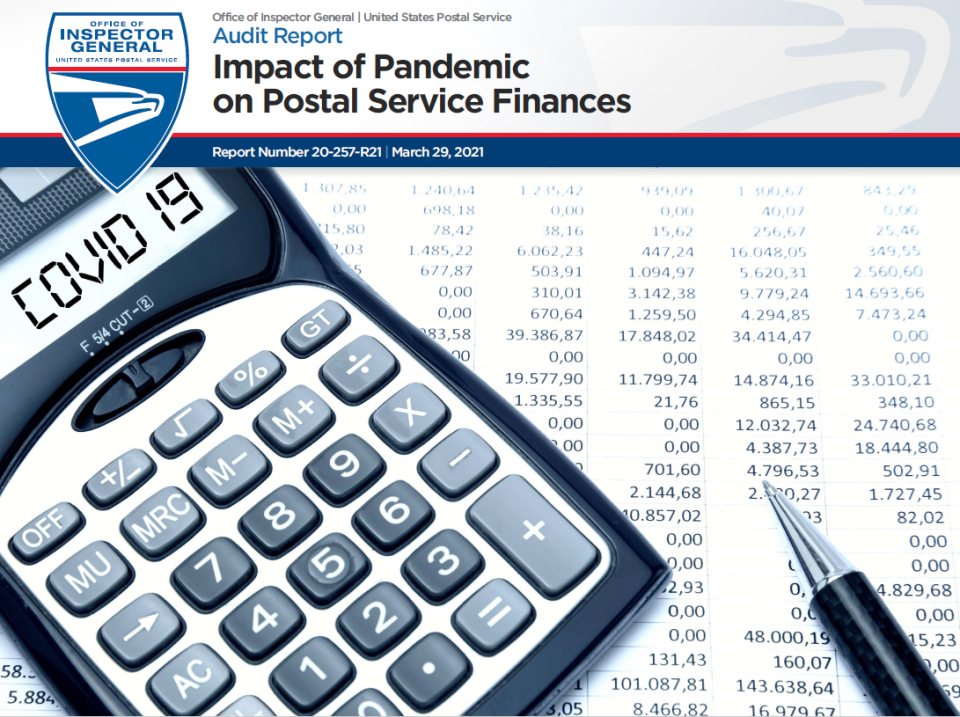Impact of Pandemic on Postal Service Finances
Objective
On March 13, 2020, the President of the U.S. issued the national emergency declaration concerning the COVID-19 pandemic (pandemic). During the ongoing pandemic, the U.S. Postal Service provided essential services as part of the nation’s critical infrastructure by continuing to process and deliver mail and packages. The pandemic continues to have an unpredictable impact on Postal Service operations and finances.
From March through September 2020, the Postal Service separated pandemic-related expenses from daily operating expenses to determine the financial impact. These pandemic-related expenses included supplies, services, transportation expenses, and sick and annual leave expenses, among others. Some expenses, such as supplies and services, were directly tracked while others, like transportation expenses, were estimated.
Additionally, the Postal Service generates cash almost entirely through the sale of postal products and services. For a decade prior to the pandemic, the Postal Service publicly expressed concerns regarding its financial liquidity. During the pandemic, the Postal Service’s concerns intensified, and management believed liquidity would decline sharply. In March 2020, Congress passed legislation authorizing additional borrowing authority, up to $10 billion, for the Postal Service. This legislation also deferred Social Security taxes for employers, including the Postal Service, through the end of calendar year 2020.
Our objective was to assess the impact of the pandemic on Postal Service finances.
Findings
The pandemic impacted the Postal Service’s finances; however, impacts were not entirely negative. Although expenses did increase because of the pandemic, near-term liquidity improved, as package volume and revenue increased in the second half of fiscal year (FY) 2020. Specifically, revenue at FY 2020 year-end was $73.1 billion, which was between $2.9 and $6 billion greater than pandemic projected scenarios. The increase in revenue was largely driven by ongoing, unpredictable package volume increases. We evaluated the pandemic’s impact on projected versus actual revenue in a separate audit.
Although management made considerable efforts to isolate expenses specific to the pandemic, the Postal Service did not capture all pandemic-related expenses in a timely or consistent manner. Specifically:
- Expenses were not consistently tracked.
- Expenses charged to gift cards were double counted and misallocated.
- Voyager Card systems did not clearly identify or track all pandemic-related transactions.
- Methodologies to estimate pandemic-related impacts to transportation and leave expenses were not documented and were largely based on professional judgement.
As of September 2020, the Postal Service reported about $744 million in pandemic-related expenses for items such as safety and cleaning supplies, increased transportation costs, and increased leave usage. Specifically, the Postal Service reported expenses in the following categories:
- Supplies and cleaning materials: $204 million
- Pending pandemic-related field expenses not yet transferred to the centralized account: $10 million
- Pandemic postcards to the public: $4 million
- Transportation expenses: $124 million
- Leave expenses: $402 million
Transportation and leave pandemic-related expenses could not be directly identified; therefore, management developed methodologies to estimate these expenses. We could not assess the reasonableness of the methodologies because they were not well- documented and were largely based on professional judgement.
Further, through a survey issued to 13 financial managers in the field, we determined that there was no documented procedure outlining how tracking and reporting of expenses should occur. Survey results indicated expense reports were submitted at different intervals, making it difficult to directly track pandemic-related expenses.
In a subsequent meeting, management provided an updated workbook outlining an enhanced validation process to ensure pandemic-related expenses are tracked and supported. The workbook contains enhancements to the original expense tracking process we evaluated in this report. Although we have not fully evaluated the workbook, which is in draft, it provides a more thorough analysis and validation for pandemic-related expenses. We may conduct future audit work around Postal Service requests for COVID-19 expense reimbursement.
Although the pandemic could not be anticipated and management worked swiftly to put measures in place to account for pandemic-related expenses, without specific policies or procedures, the Postal Service was unable to efficiently track expenses resulting from the pandemic.
By the end of FY 2020, the pandemic had not produced the sharp decline in liquidity that Postal Service management anticipated early in the pandemic. Instead, cash flows exceeded expectations, due to sharply rising package revenues, management actions, and employer Social Security tax deferrals. Management’s actions included borrowing, reducing planned capital expenditures, and defaulting on fiscal year-end retirement payments. With strong cash flows contributing to record fiscal year-end cash of $14.4 billion, the Postal Service did not borrow against the $10 billion Congress authorized in the March 2020 legislation. Further, management ensured compliance with the Postal Reorganization Act annual debt limit through timely debt repayment. While the effects of the pandemic on the Postal Service’s liquidity have been favorable to date, the remaining length and severity of the pandemic’s impacts are unknown.
Recommendation
We recommend management develop specific policies and procedures to ensure expenses are consistently documented, validated, and tracked for unanticipated crisis or catastrophic events.

